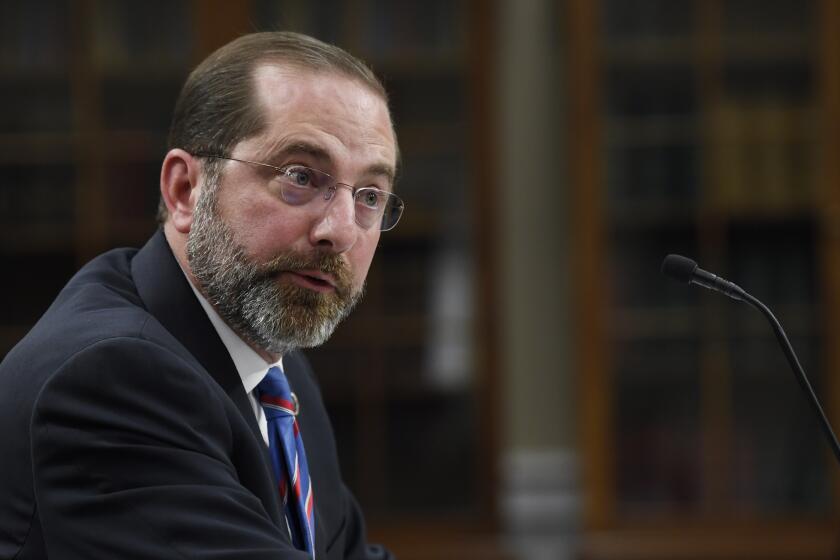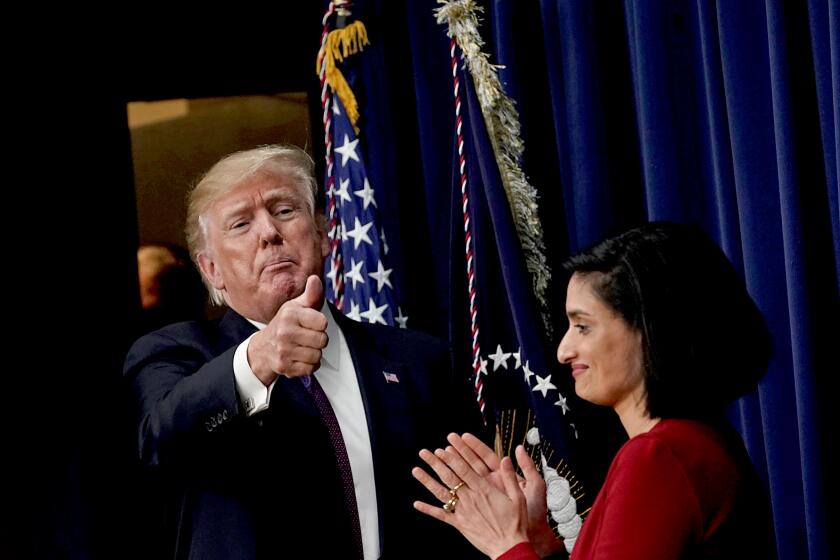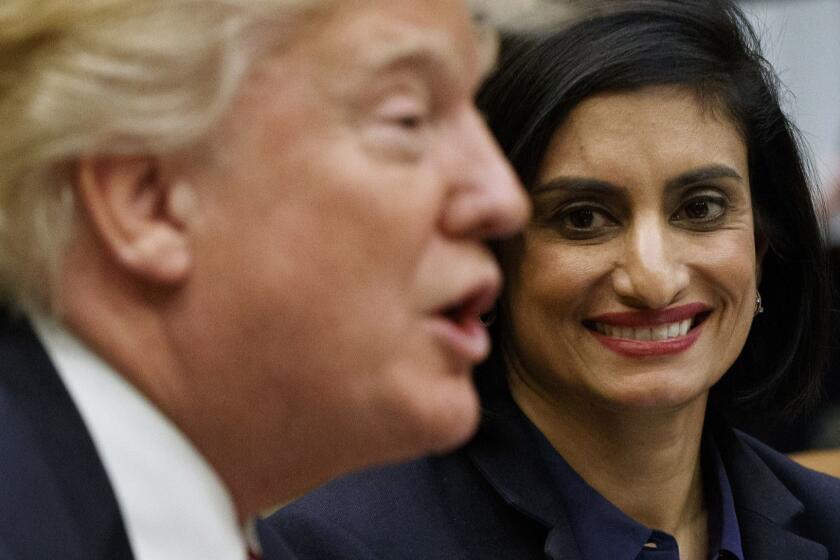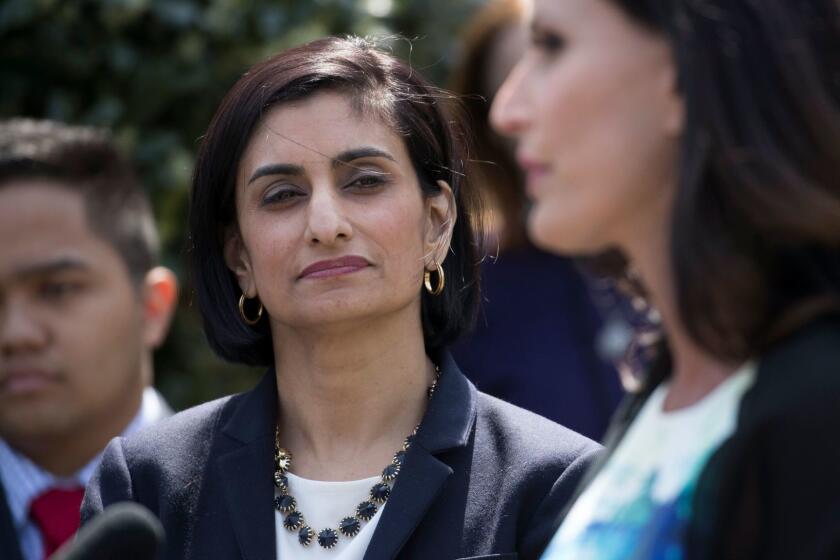Column: The coronavirus crisis exposes the stupidity of Trump’s healthcare policies
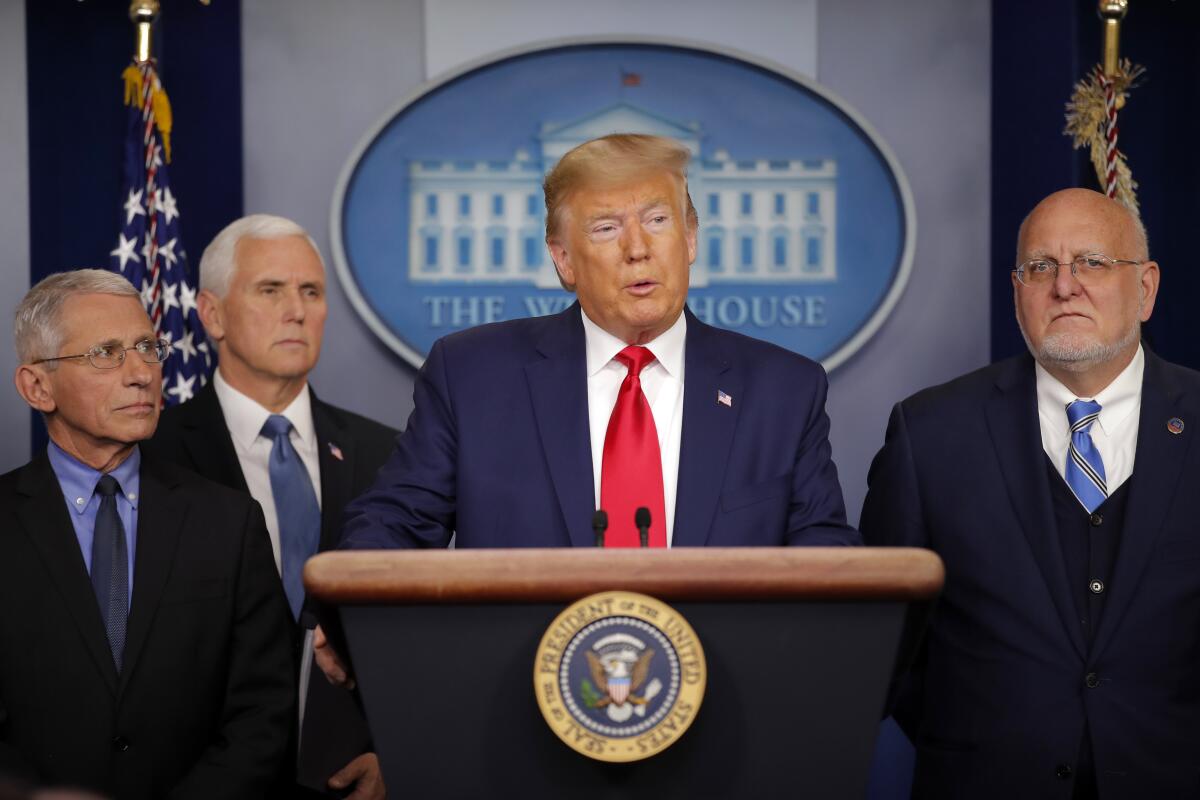
- Share via
Until now, President Trump’s approach to healthcare was alarming chiefly to discrete populations such as low-income families, immigrants, people with preexisting conditions and seniors.
They were in the crosshairs of initiatives to hamstring Medicaid, prevent undocumented residents from seeking medical treatment, destroy the Affordable Care Act and raise the cost of Medicare.
But the world has been changed by the novel coronavirus. Now it’s clear that all these initiatives present a healthcare threat to everyone. They stand in the way of comprehensive screening and treatment for COVID-19, the disease caused by the virus.
If there is widespread community infection and plenty of people unexpectedly being admitted to hospitals for significant care, things could get expensive fast in an unanticipated manner.
— David Anderson, Duke University
Trump’s hostility to public health programs blinds his administration to how to use the tools already at hand to combat the threat. Precedent exists for using Medicare to bring expensive medical services to Americans--of any age, not just 65 and older--who can’t access them any other way. Will the Trump administration get the message? It’s doubtful.
The administration has treated proposals for universal healthcare with unalloyed disdain, even though any such system would give the government the ability to fight an emerging pandemic such as COVID-19 by taking over the cost from states and families. Instead, officials such as Seema Verma, the director of the Centers for Medicare and Medicaid Services, has gone on the road to attack proposals such as “Medicare for all” and the public option as “radical socialist ideas.”
Medicaid is perhaps the prime target of the Trump healthcare wrecking crew. The Trump administration wants to hobble Medicaid by converting it to a block-grant program. The coronavirus shows exactly why that idea would be sheer folly.
By limiting sick leave and free healthcare, the U.S. system will promote the spread of coronavirus.
Medicaid is the nation’s largest public healthcare program, with more than 71 million enrollees as of the end of 2019. Because the federal government covers at least 50% and as much as 90% of states’ expenditures for those enrollees, it’s ideal for delivering the kind of services that will be urgently needed as COVID-19 spreads across the country.
It’s also uniquely flexible. States are responsible for enrollments and treatments, and hand the bills over to the feds for the appropriate reimbursement. That allows Medicaid funding to rise or fall with need, responding to unforeseen shocks.
In the past, such shocks have included storms like Hurricane Maria in Puerto Rico, new and expensive technologies like hepatitis C cures or disease outbreaks like Zika — or COVID-19.
Block grants don’t respond to shocks. Under an administration proposal made official on Jan. 30, states would receive a lump sum for Medicaid based on their past experience. If their spending came in below the lump sum, they could pocket the difference for spending on other health programs; if it exceeded the block grant, they’d be on the hook for the excess, 100%.
The danger here is obvious. COVID-19 is almost certain to drive up screening and treatment costs in almost every state. To contain its spread, many residents will have to be tested. Some will have to be quarantined in hospital wards, served by medical professionals with specialized equipment.
Under the best circumstances, the public health infrastructure of even affluent states will be tested; in poor states, it will face utter collapse. If they’re reliant on Medicaid to help cover the cost, they’ll be sunk.
The administration proposal does offer a relief valve in the event of “unforeseen circumstances out of the state’s control, such as a public health crisis.” But it’s not a simple fix.
The latest effort to gut Medicaid is Trump at his most dangerous.
As the proposal sets forth, states will have the “opportunity to submit new information and relevant data, describe the circumstances and proposed amendment, and renegotiate relevant [terms and conditions]. The data provided by the state will be validated” by federal Medicaid officials “in consultation with other appropriate federal entities.”
That sounds like a six-month process, or more. As health insurance expert David Anderson observes, “If there is widespread community infection and plenty of people unexpectedly being admitted to hospitals for significant care, things could get expensive fast in an unanticipated manner.”
Medicaid block grants, however would create “a lag and an uncertainty on the part of a state as to whether or not a public health crisis will have additional federal funding under a proposed Medicaid block grant. Under current rules, the new, unexpected claims are submitted to CMS and the funds show up in the normal course of business. The uncertainty would cast a pall on decisionmakers.”
The block-grant proposal was issued before COVID-19 struck. Proof of its folly couldn’t have come faster.
That’s true, too, of the administration’s other favorite initiative on Medicaid, which is the imposition of work requirements.
Although work rules have been blocked in federal court, the proposals originally implemented by Arkansas and contemplated by Kansas and other states would have thrown enrollees off the program for failing to work a minimum number of hours a months or documenting their work histories. Even worse, the proposals would have locked people out of Medicaid for months if they breached the rules.
Seema Verma, the federal official in charge of Medicare, Medicaid and the Affordable Care Act, has blasted into the limelight. And not in a good way.
All this is especially worrisome because the target population for Medicaid could be especially susceptible to the spread of COVID-19. In the cities, low-income neighborhoods tend to be more densely populated, making it harder to isolate patients. They have less access to medical treatment.
Trump has further undermined the ability of public health programs to reach them by imposing the so-called public charge rule, which penalizes immigrants — documented and otherwise — for utilizing public assistance programs, like Medicaid. If one were determined to spread COVID-19 as fast as possible, driving a susceptible population underground and depriving them of treatment would be a perfect way to do it.
Meanwhile, Trump has taken steps to undermine an important instrument for getting treatment, especially a vaccine, to the public. That’s the Affordable Care Act, which requires that insurers provide certain preventive vaccines to their members without co-pays or deductibles. A COVID-19 vaccine, once it’s available, would almost certain make the list, as do seasonal flu vaccines.
But if the ACA is declared unconstitutional in federal court, as the administration advocates, that mandate would disappear. Price is a significant obstacle to medical treatment in the U.S. across the board.
The Supreme Court announced Monday that it would take up the federal lawsuit aiming to overturn the law, brought by Texas and 17 other red states and supported by the Trump White House. That’s being viewed as a positive development by the law’s defenders, who include California and other blue states. But it means a decision probably won’t be rendered until next year.
Another feature of the American healthcare system that complicates the fight against the novel coronavirus is its reliance on insurance deductibles and co-pays to reduce the utilization of medical care. The idea here, favored by conservatives, is that giving patients “skin in the game” by requiring them to shoulder some of the cost of care will force them to think carefully about their healthcare choices.
As John Graves of Vanderbilt point out, however, that system makes the timing of the coronavirus “uniquely challenging.” The reason is that relatively few insurance customers have hit their deductibles this early in the year. Therefore, they’ll be paying more out-of-pocket for testing or treatment. Insurance should encourage customers to seek out services in a public health crisis, but the skin-in-the-game system discourages them instead.
Several studies have shown that deductibles and other cost-sharing tools do discourage people from seeking unnecessary treatment, but discourages them from seeking necessary treatment too.
Trump claims enrollees are gaming Medicaid eligibility, but there’s no evidence for the claim.
The most important unanswered question about the Trump administration’s response to COVID-19 is whether it will exploit the opportunities that exist in the national healthcare infrastructure to stem the infection’s spread, or whether Trump will fixate on the response of the stock market to the crisis. (Since the stock market showed a strong recovery during Monday’s trading, will that signal Trump that the crisis is over?)
A good model for the government to follow comes from the 1970s, when Congress used Medicare to address a crisis afflicting end-stage renal disease patients. Since kidney dialysis, the condition’s chief treatment, was so expensive that those patients could not obtain medical insurance at any price, Congress decreed that dialysis for patients of any age would be covered by Medicare.
Democrats in Congress may be moving in that direction. Over the weekend, Senate Minority Leader Chuck Schumer, D-N.Y., advocated that any COVID-19 vaccine be covered by Medicare. Schumer was reacting to the doubts expressed by Health and Human Services Secretary Alex Azar that a vaccine would be universally affordable, but it’s unclear if Schumer meant that to apply only to those over 65 and eligible for Medicare, or to everyone. It should be the latter.
The main problem with Trump’s healthcare policies raised by the coronavirus crisis is its uncaring approach to the beneficiaries of the nation’s healthcare programs, especially Medicaid and the ACA.
The administration treats those programs as handouts to a privileged class of low-income Americans. Last January, Verma, who as director of the Centers for Medicare and Medicaid Services is Medicaid’s chief, implied in a speech that the program was irrelevant to anyone who was working or healthy.
“To most of us, Medicaid is remote,” she said. As I reported then, she couldn’t be more wrong. Medicaid pays for roughly half of all births in the United States, covers 62% of all nursing home residents, is the largest single source of payment for mental health services and provides coverage for one-third of all children in the U.S. Medicaid, Medicare and the ACA could do so much more, if this administration focused on using them, instead of killing them.
More to Read
Inside the business of entertainment
The Wide Shot brings you news, analysis and insights on everything from streaming wars to production — and what it all means for the future.
You may occasionally receive promotional content from the Los Angeles Times.

